Questões de Língua Inglesa da Fundação para o Vestibular da Universidade Estadual Paulista (VUNESP)
Lista completa de Questões de Língua Inglesa da Fundação para o Vestibular da Universidade Estadual Paulista (VUNESP) para resolução totalmente grátis. Selecione os assuntos no filtro de questões e comece a resolver exercícios.
Língua Inglesa - Gramática - Fundação para o Vestibular da Universidade Estadual Paulista (VUNESP) - 2012
Em cada uma das questões de números 46 a 60, reproduziu- -se trecho de uma breve conversa. Assinale a alternativa que apresenta a palavra ou expressão que preenche a lacuna corretamente.
Im sure you enjoyed your Caribbean vacation.
Yes, it looked ______________ paradise.- A.
as
- B.
as if
- C.
of
- D.
like
- E.
at
Língua Inglesa - Gramática - Fundação para o Vestibular da Universidade Estadual Paulista (VUNESP) - 2012
Em cada uma das questões de números 46 a 60, reproduziu- -se trecho de uma breve conversa. Assinale a alternativa que apresenta a palavra ou expressão que preenche a lacuna corretamente.
I am applying to Harvard next semester.
How can you ever hope ____________ accepted there?- A.
in being
- B.
to be
- C.
being
- D.
that you are
- E.
you should be
Língua Inglesa - Gramática - Fundação para o Vestibular da Universidade Estadual Paulista (VUNESP) - 2012
Em cada uma das questões de números 46 a 60, reproduziu- -se trecho de uma breve conversa. Assinale a alternativa que apresenta a palavra ou expressão que preenche a lacuna corretamente.
He is not in right now. Can I take a message?
Yes,____________ John call me when he gets back to the office.- A.
get
- B.
ask
- C.
do
- D.
please
- E.
have
Língua Inglesa - Interpretação de Texto - Fundação para o Vestibular da Universidade Estadual Paulista (VUNESP) - 2012
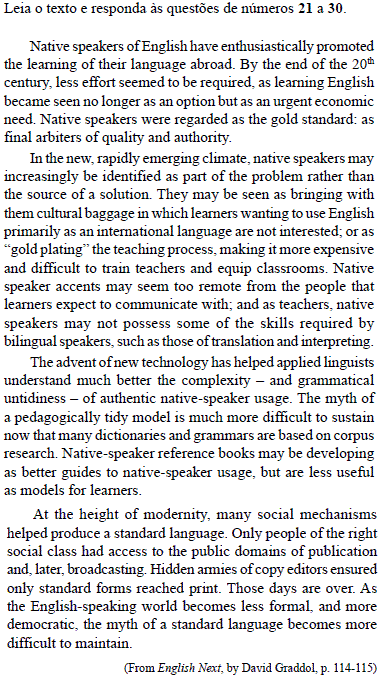
According to the first paragraph,
- A.
native English speakers are to be considered the standard foreigners should imitate.
- B.
other languages have slowly been taking the place of English in world communication.
- C.
the economic crisis in the English-speaking countries has reduced the role of English internationally.
- D.
there seems to be little need for promoting the importance of learning English nowadays.
- E.
international English depends on the native speakers of the language to become accepted.
Língua Inglesa - Interpretação de Texto - Fundação para o Vestibular da Universidade Estadual Paulista (VUNESP) - 2012
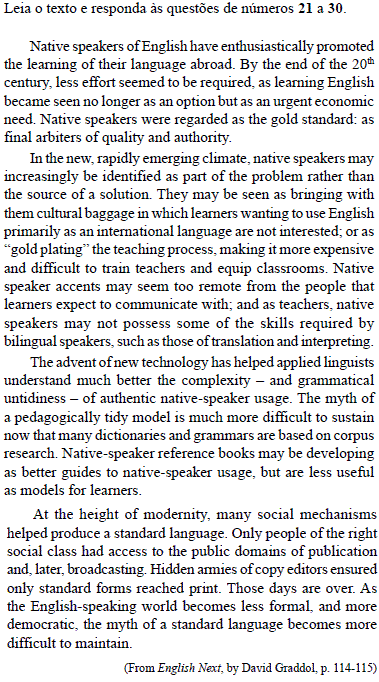
The role played by native speakers of English, as discussed in the second paragraph,
- A.
is a crucial one in modeling correct pronunciation when teaching non-natives.
- B.
has been minimized in the teaching of English as its international use increases.
- C.
remains of utmost importance because of their familiarity with English-speaking culture.
- D.
is fundamental in the teaching of skills such as those needed for translating.
- E.
has been increased due to the need of training new teachers all over the world.
Língua Inglesa - Interpretação de Texto - Fundação para o Vestibular da Universidade Estadual Paulista (VUNESP) - 2012

According to the third and fourth paragraphs,
- A.
new technology has allowed people all over the world to have access to standard English as spoken in English-speaking countries.
- B.
as more dictionaries and grammars are produced based on corpus research, non-native speakers have more reliable learning tools to learn correct English.
- C.
the use of copy editors associated with new technological advances such as computerized corpora allows learners to have more correct models to imitate.
- D.
the English used in broadcasting has been more widespread all over the world because of the increased use of modern technology and has become the model for teaching.
- E.
as more people abroad have access to English as spoken by native speakers it becomes more difficult to continue with the idea of a standard form to be taught.
Língua Inglesa - Interpretação de Texto - Fundação para o Vestibular da Universidade Estadual Paulista (VUNESP) - 2012
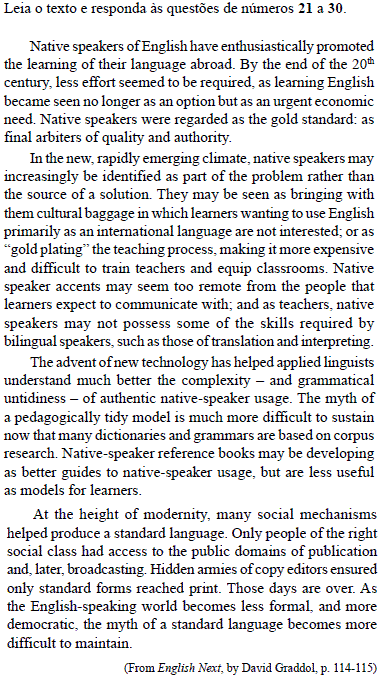
The modal may is used several times in the second paragraph. In the context, it denotes
- A.
possibility.
- B.
ability.
- C.
condition.
- D.
advisability.
- E.
necessity.
Língua Inglesa - Interpretação de Texto - Fundação para o Vestibular da Universidade Estadual Paulista (VUNESP) - 2012

By referring to the grammatical untidiness of authentic native-speaker usage in the third paragraph, the author indicates that the use of English grammar by its native speakers is
- A.
careless.
- B.
effective.
- C.
precise.
- D.
correct.
- E.
inefficient.
Língua Inglesa - Interpretação de Texto - Fundação para o Vestibular da Universidade Estadual Paulista (VUNESP) - 2012
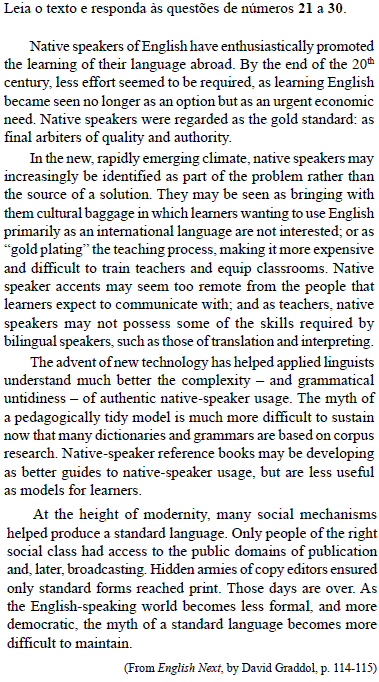
The idea expressed in the sentence from the last paragraph Hidden armies of copy editors ensured only standard forms reached print. is that
- A.
copy editors had to work in secret so that authors never knew that their writing would be adapted to what the publishers wished.
- B.
publishers did not want the public at large to realize that some well-know writers needed to have their work revised.
- C.
due to the formality of the English used at the time, most authors resorted to ghost-writers to help them with their work.
- D.
the language used in books and magazines was always revised to make sure it represented the ideal of acceptable English.
- E.
only standard English was adopted by writers and broadcasters, who all belonged to the higher levels of society.
Língua Inglesa - Interpretação de Texto - Fundação para o Vestibular da Universidade Estadual Paulista (VUNESP) - 2012
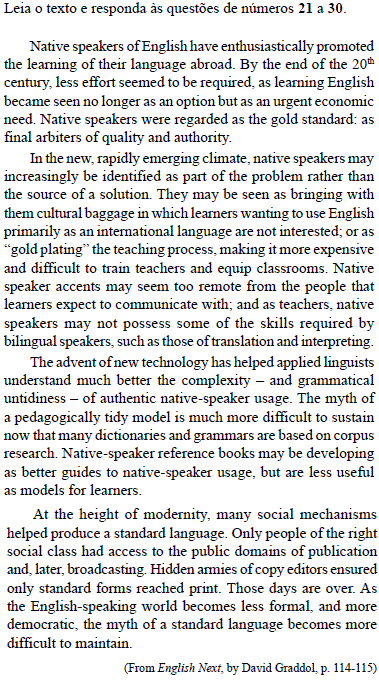
According to the ideas developed in the second paragraph, one could say that an emphasis in the teaching of English pronunciation according to native-like models in a class in the public school system of a country like Brazil would be
- A.
important.
- B.
difficult.
- C.
irrelevant.
- D.
desirable.
- E.
impossible.


